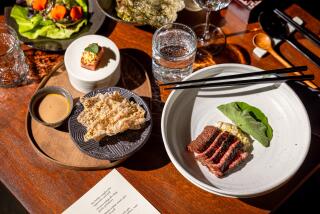When You Say Hors D’oeuvres, You’ve Said a Mouthful
- Share via
Having dealt recently with such questions as the proposal to kill all defective infants at birth and the rejection of atheist boys by the Boy Scouts, I am relieved now to deal with a complaint of a much less incendiary nature.
Mark Marquardt of Lancaster urges me to “conjure up” or to flush from my readers a word to replace “that awful word-- hors d’oeuvre. “
Marquardt notes that he always has to look the word up in his dictionary to make sure he spells it right. “Who needs a word like that?”
I have the same problem. I can never remember how to spell hors d’oeuvre. It shouldn’t be that hard, but there is something about the combination of oeu that eludes my memory.
Hors d’oeuvre is a word or term that doesn’t come up that often. Rarely do I have occasion to write it. And if a dictionary is not handy, I can always substitute canapes.
My dictionary defines hors d’oeuvre as simply “an appetizer, as olives, anchovies, canapes, etc., served usually at the beginning of a meal.”
That suggests that a canape is a certain type of hors d’oeuvre. Canape is defined as “a small piece of bread or toast or a cracker, spread with spiced meat, fish, cheese, etc., served as an appetizer, often with drinks.”
That there are hors d’oeuvres other than canapes is demonstrated by the prestigious cookbook “Larousse Gastronomique,” which has no fewer than 34 pages of recipes for hors d’oeuvres.
At the outset it explains that these snacks, “by definition, are additional to the menu. They should therefore be light and very delicate, especially when served before a rather heavy menu consisting of a number of courses.”
As a light eater, I shudder at the thought of a heavy dinner consisting of a number of courses, especially when preceded by a plethora of hors d’oeuvres.
That a proper hors d’oeuvre is something more than a snack is evident in the book’s note on the presentation of cold hors d’oeuvres. “These snacks must be presented elegantly. The lady of the house must not only supervise their presentation, but must cooperate in it and put herself out to devise original and graceful decorative effects.”
Of course most parties one goes to these days are catered, so the hors d’oeuvres are prepared without the supervision or the touch of the lady of the house. In fact, they have a manufactured look, as if each had been stamped out by machine, instead of formed artistically by our lady’s hand.
It is probably just as well, since the way these tidbits are tossed into the maws of milady’s guests, it would seem a discourtesy were they the work of her own delicate hand.
To show how complicated this art is, Larousse suggests that the decoration of hors d’oeuvres can be varied by the use of capers, gherkins, red pomegranate seeds, hard boiled eggs (halved, quartered or chopped), small pickled onions, onions sliced into rings or chopped, small kidney beans, French (string) beans, green peas, asparagus tips, boiled carrots and turnips, radishes, black radish, the leaves and stalks of leeks, red and green peppers, yellow, red and green peppers, mushrooms, truffles, etc.
Obviously a morsel whose creation depends on such a diversity of ingredients can hardly be called anything as gross as an appetizer or even a canape. Thus that snooty French term, hors d’oeuvre.
My dictionary tells me only that hors d’oeuvre means, literally, “outside of work.” Since so much work goes into their preparation, I don’t see how the term could have come to mean what it means.
I’m afraid I have wandered from Marquardt’s point. He finds hors d’oeuvre not only hard to spell but pretentious. He says it doesn’t fit a group he travels with in recreational vehicles.
“In that group,” he says, “I see ‘chips and dips.’ Now that isn’t very classy, but at least I know what it is. I suppose on an engraved invitation to an ‘opening’ chips and dips just wouldn’t cut it.”
I agree. I go to a lot of “openings” of the kind Marquardt evidently has in mind, but I have never seen “chips and dips” on the invitations.
But Marquardt also belongs to another RV group of retired military types who adorn their programs for camp-outs (“musters,” actually) with two kinds of hors d’oeuvres--heavy and light.
“At our first muster I asked the muster-master the difference. He said, ‘Light, you just sort of nibble at chips and dips and then go to your rig for a nice dinner. Heavy, well, you load up on the goodies and just forget dinner.”
I wish they’d label them light and heavy at openings.
More to Read
Eat your way across L.A.
Get our weekly Tasting Notes newsletter for reviews, news and more.
You may occasionally receive promotional content from the Los Angeles Times.










